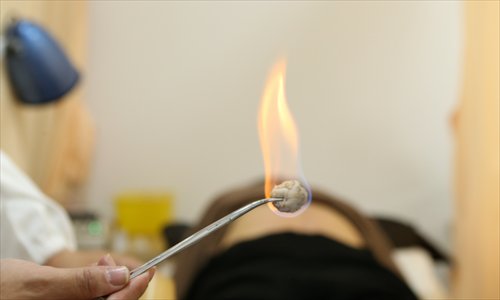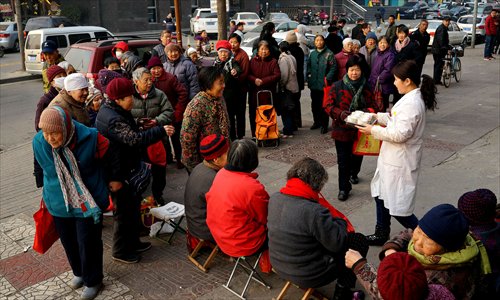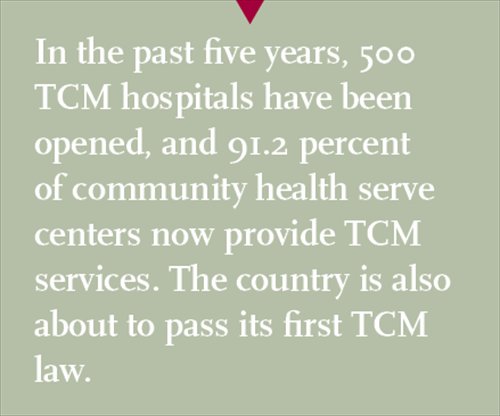Gansu official sets quota, 80 percent of patients should use TCM
Gansu official sets quota, 80 percent of patients should use traditional medicine
The health authorities of China's northwestern province of Gansu have been enthusiastically promoting traditional Chinese medicine (TCM) in their healthcare reform, and have included TCM in the region's medical insurance system. However, their plan is being criticized by those who say China shouldn't forcefully push for the development of TCM until it's been tested by modern science.

A TCM practitioner prepares to perform acupuncture on a patient. Photo: IC
After rushing to a hospital to visit 22 children who had just been in a terrible car accident, Liu Weizhong immediately suggested the nurse give the children pig's feet soup to drink, especially the one who was still in coma.
The nurse, who did not recognize Liu, director of the Gansu provincial Department of Health, said that the child is in gastric dilatation and should fast for four to five days. The director of the hospital told her to do what Liu said.
Later the child in the coma woke up and began to eat. Pig feet's soup then became a famous dish in Gansu, as people decided that the soup was the deciding factor in the children's recovery. Liu was ironically referred to by netizens as the "pig feet director."
Recalling the 2011 incident, Liu, 58, told the Southern Weekly that he was taking a big risk. "What if the child died?" he said.
During his eight years with the Department of Health, he has always been in the center of controversies as he fervently promotes TCM not only in the province but also on his social media accounts, angering many medical professionals who doubt the efficacy of TCM.
While he is under fire, on April 11, Liu attended the monthly news conference of National Health and Family Planning Commission (NHFPC), where he touted Gansu's healthcare reform. As the NHFPC rarely allows a province to boast of its achievements at this kind of conference, some analysts speculated that the commission was implicitly endorsing Gansu's pro-TCM measures.
However, it's still being debated whether TCM should be pushed by the government, because there are still some controversies about whether it's a legitimate form of therapy.

A staff member dispenses TCM herbal drinks to elderly people in Xi'an, Shaanxi Province. Photo: IC
Radical reform
When Liu started work at the Gansu provincial Department of Health in 2008, he worried so much about Gansu's medical reform when he looked at its barren mountains. "Gansu is a poor province. So we have to use cheap methods," he said.
According to local statistics from 2007, in that year 70 percent of Gansu patients who needed hospitalization did not get any hospital treatment due to a shortage of funding.
"We don't have money, technology and there are too many patients. How can we reform our system?" said Liu.
After careful consideration, he decided to promote TCM. The reasons are simple according to him: the medicines are cheap, people accept TCM, and he believes TCM can both treat and prevent diseases.
Pioneering reform to push TCM officially kicked off in Gansu in 2009. The province announced that locals would receive free TCM diagnoses and treatment and released dozens of policies to develop TCM.
The Gansu health department employed a propagandist for each village. These young people not only explained the policy to the locals but also painted walls with TCM factoids. So far, they have painted 71,322 walls.
The health department also gave 4.8 million urban and suburban households TCM packages containing thermometers, scraping plates, cupping devices and other items.
Liu required the province's comprehensive first-class hospitals which at the time mostly offered Western medicine to establish TCM departments as well as TCM pharmacies. He ordered that at least 5 percent of their beds be made available for TCM patients.
At the beginning, Liu's policy was strongly opposed by the Gansu Provincial Cancer Hospital (GPCH). The doctors said that cancer patients need to go through surgery and radiotherapy. To them, TCM is just an accessory to proven Western treatments.
Liu later changed the head of the GPCH, and many doctors in the hospital left. "More than 20 experts quit," he said.
In the interview with Southern Weekly, Liu said that now the GPCH has become a role model in promoting TCM. In the cancer hospital, TCM prescriptions are everywhere. In the wards, massage, acupuncture and foot baths are given to cancer patients.
Liu decided that grass-roots doctors need no medical education background to practice TCM. Now there are 27,235 TCM practitioners in Gansu.

Making achievement
Now the average per capita medical costs in Gansu are the lowest in China. Liu boasted that at a time when medical costs in the country are going up, Gansu's are decreasing.
After the reform, the average cost of hospital treatment in the GPCH decreased by 4,000 yuan ($618).
In terms of curbing the overuse of antibiotics - which can lead to the evolution of antibiotic-resistant viruses and are expensive - He Jing, an obstetrician who has been working in Gansu for 30 years, said that Gansu has been more effective at this task than other provinces.
In Gansu, doctors can only prescribe two shots of antibiotics for a caesarian. For minor operations, the use of antibiotics is forbidden. "In other places, they only use those expensive medicines," said He.
Liu said Gansu heavily punishes the overuse of antibiotics. "In five years, we've punished about 5,000 doctors. Some were demoted and it was noted on some of their records that they had performed poorly," he said.
To ensure the hospitals get their patients to use TCM, quotas have been set. In the province's comprehensive hospitals, the TCM participation rate for patients should reach 80 percent, 90 percent for those suffering from serious diseases. TCM should make up at least 20 percent of total expenses.
A local citizen surnamed Sun told the Global Times that in underdeveloped regions like Gansu, people trust TCM more - especially when it comes to treating the elderly.
But she said that the promotion of TCM should not become extreme. "Choosing either TCM or Western medicines should depend on the illness you have," she said.
According to the timetable provided by the State Council, the country will establish a "hierarchical" medical system by 2020, in which different problems are treated at different medical institutions to reduce pressure on the countries' higher-level medical institutions. But Liu decided to accomplish it by 2017.
In Gansu, only 49 out of 350 diseases covered by medical insurance policies can be treated at the first-class hospitals. Patients who go to the hospitals with other problems must pay for their treatment.
After implementing the policy in February, some comprehensive hospitals in Gansu's capital Lanzhou have seen empty beds for the first time. While county-level hospitals are packed.
Medical experts in big hospitals need to go to rural hospitals to assist staff there for at least six days every season.
However, Li Qingfeng, 30, said that after spending one year in a county-level hospital, he felt such reform was not as effective as hoped. The only memory of his time there is of the long commute back and forth. "It's like I'm taking a break. The rural environment is good," he said.
Controversy remains
The effectiveness of TCM has always been a topic of fierce discussion. Many Western medicine doctors argue that as TCM treatments are not subject to the rigors of peer-reviewed studies, they are not reliable and may even be harmful.
Yao Jia, from East China's Jiangsu Province, said she spends much of her time correcting friends and relatives' "false" belief in "traditional prescriptions," such as drinking herbal tea to cure sickness or eating donkey skin to increase their blood level.
"Besides, I've read reports about how some herbal medicines can be poisonous and harmful to health," she said. "Unless the medicine goes through scientific tests using modern methods, I'm not going to trust it."
The total output value of the TCM industry reached more than 730 billion yuan in 2014, making up one third of the total value of the medical industry, according to a 2016 Xinhua News Agency report. Wang Guoqiang, director of the State Administration of TCM said that in the past five years, 500 TCM hospitals have been opened, and 91.2 percent of community health serve centers now provide TCM services. The country is also about to pass its first TCM law.
In recent years, many provinces across China have started to include TCM into their public medical insurance programs, such as reimbursing the costs of acupuncture, and herbal medicine.
At the end of last year, a TCM law was drafted and submitted to the Standing Committee of the National People's Congress for review. The draft regulates TCM, as well as makes suggestions on how to improve TCM. But many experts questioned it on the base of whether TCM is a legitimate science.
Global Times - Agencies
Newspaper headline: TCM on top